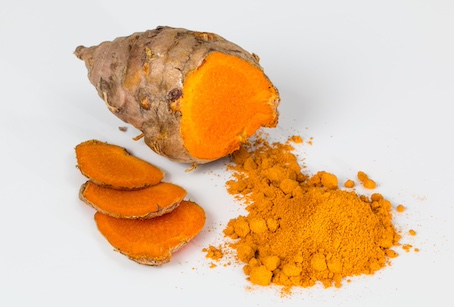
You may be familiar with turmeric (Curcuma longa L.) as the boldly yellow, earthy, mildly sweet spice often used in Indian and Middle Eastern cuisine. In addition to adding delicious flavor and color to dishes (and garments), turmeric also has a long history of use in Ayurveda and Chinese medicine. The many turmeric benefits for men and women are attributed to its main pigmented bioactive compounds, called curcuminoids, the most well-known being curcumin.
What does this beloved spice have to offer beyond its culinary contributions? Let’s take a deep dive into the 20 benefits of turmeric, including the advantages of turmeric for skin, immune health, brain function, disease prevention, and more.
1. Anti-inflammatory Properties
Inflammation is an underlying factor in many chronic conditions, including obesity, cancers, inflammatory bowel disease, and arthritis. Curcumin inhibits several molecules that play a role in inflammation, like cytokines, helping reduce inflammation in your body.
2. Antioxidant Effects
Antioxidants are compounds that help protect your cells from oxidative stress and damage that can lead to disease. Turmeric contains powerful antioxidants that can help reduce your risk of chronic diseases and even slow the aging process.
In one 2020 study, researchers examined results from 4 studies involving 308 participants, finding that curcumin (the average dose was 645 mg/day, equivalent to approximately 1/10th of a teaspoon) significantly increased total antioxidant capacity and reduced oxidative stress markers.
3. Supports Healthy Brain Function
Curcumin can boost levels of brain-derived neurotrophic factor (BDNF), which is linked to improved brain function and a lower risk of devastating diseases like Alzheimer’s dementia.
A 2019 meta-analysis of 4 studies involving 139 people found that 200 mg/day of curcumin for 8 weeks and 1820 mg per day for 12 weeks (both less than half a teaspoon per day) significantly increased blood levels of BDNF.
4. Reduces Risk of Heart Disease
Curcumin improves how well your endothelium (the lining of your blood vessels) functions, helping to regulate blood pressure and clotting, reducing the risk of heart disease.
A 2017 study found that 12 weeks of 2000 mg/day of curcumin improved endothelial function by increasing the availability of nitric oxide — a gas that helps widen your blood vessels and improve blood flow — and reducing oxidative stress.
5. Has Cancer Preventive Properties
Studies suggest that curcumin can inhibit the growth and spread of cancerous cells, potentially reducing the risk of various cancers. Some researchers even say that curcumin is a promising candidate as an anticancer drug, either used alone or in combination with other drugs.
6. Aids in Digestive Health
Turmeric stimulates the production of bile, which helps in the digestion of fats and promotes overall digestive health.
While more research is needed, one 2021 review of 21 studies involving 1478 gastrointestinal patients found that curcumin showed beneficial effects on irritable bowel syndrome, ulcerative colitis, H. pylori infection, peptic ulcer disease, and Crohn’s disease.
7. May Help Alleviate Arthritis Symptoms
Due to its anti-inflammatory properties, turmeric may help reduce the pain and stiffness associated with arthritis.
A 2016 review of eight studies found that around 1000 mg per day of curcumin for 4-8 weeks could be a beneficial aspect of arthritis treatment, though more research is needed.
8. Supports Liver Health
Turmeric has been shown to detoxify the liver and enhance its ability to process and eliminate toxins. Researchers think it works through mechanisms like reducing inflammation and increasing antioxidant defenses.
9. Boosts Immune System
Curcumin has antimicrobial effects, coordinating with various immune cells to boost your body’s defense systems against illness and infections.
10. Improves Skin Health
The potent anti-inflammatory and antibacterial properties are likely responsible for the advantages of turmeric for the skin. It may help manage certain skin conditions like acne, eczema, and psoriasis.
One 2016 systematic review examined 18 studies exploring oral and topical uses of curcumin for skin conditions, finding significant improvements in skin health compared to controls.
11. Supports Normal Blood Sugar Management
Turmeric may help manage diabetes by improving insulin sensitivity and regulating blood sugar levels. A 2021 systematic review of 16 studies highlighted curcumin’s ability to reduce oxidative stress, inflammation, fasting blood glucose, and body mass index among people with diabetes.
12. May Help Boost Mood
Curcumin may increase serotonin and dopamine levels, which can help alleviate symptoms of depression.
A 2020 meta-analysis of 10 studies involving 531 participants with major depressive disorder or secondary depression found that curcumin was well-tolerated and effective for reducing depression symptoms. The authors even suggested it should be considered as an addition to standard care for depression and anxiety.
13. Promotes Weight Loss
Turmeric may aid in weight loss by boosting metabolism and reducing the growth of fat tissue.
In a 2021 review of 21 studies involving 1604 individuals, researchers found that curcumin supplementation (between 70 and 2400 mg/day given for 4-36 weeks) significantly reduced body mass index, weight, waist circumference, and levels of leptin (a hormone that tells your brain you’re full), while increasing adiponectin levels, a protein hormone inversely associated with body weight.
14. May Help Support Asthma Management
While not a treatment for asthma on its own, some research suggests that the anti-inflammatory properties of turmeric may help reduce the symptoms and frequency of asthma attacks.
15. May Support Joint Health
Curcumin’s anti-inflammatory properties are beneficial for your joints. It may help reduce pain, stiffness, and inflammation associated with conditions like osteoarthritis and rheumatoid arthritis.
16. Improves Memory and Attention
Regular intake of turmeric can enhance cognitive functions such as memory and attention span.
In 2021 meta-analysis of research involving 389 participants found that, compared to a placebo, curcumin was associated with improvements in working memory and a borderline benefit in processing speed. The dosages used in the studies ranged from 80 to 4000 mg (roughly 1/4 Tablespoon) over 8 to 18 months.
17. Supports Healthy Cholesterol Levels
An important aspect of supporting a healthy heart is keeping your blood fat levels in check, including cholesterol. Studies show that turmeric helps reduce LDL (bad) cholesterol and increase HDL (good) cholesterol.
18. Heals Wounds Faster
The antimicrobial and anti-inflammatory properties of turmeric can speed up the healing process of cuts and wounds. Curcumin has also been shown to stimulate the synthesis of collagen, a protein essential for wound closure and tissue repair, as well as the process of forming new blood vessels.
19. Combats Chronic Fatigue
Turmeric may help boost energy levels and reduce the symptoms of chronic fatigue by reducing inflammation and oxidative stress.
It may stimulate the function of your mitochondria, the energy powerhouses of your cells. Plus, curcumin appears to influence the activity of brain chemicals like serotonin and dopamine, which are involved in regulating mood and energy levels.
20. Aids in Managing Irritable Bowel Syndrome (IBS)
Curcumin is known for having anti-inflammatory and antioxidant properties and may help reduce the frequency and severity of IBS symptoms, like bloating, gas, and abdominal pain.
Benefits of Turmeric: Final Thoughts
Turmeric is a relatively inexpensive, delicious, and versatile spice to have in your kitchen, and you don’t have to take it as a supplement. You can purchase it as a root or a dried, ground spice.
To reap the 20 benefits of turmeric, pair it with a pinch of black pepper when cooking. The piperine in pepper has been shown to boost the bioavailability of curcumin by up to 2000%. Enjoy this pairing in homemade sauces and dips, soups, breakfast scrambles, stir-fries, and even smoothies.
If you’re interested in learning more about the health-promoting compounds hiding in your spice rack or discussing personal health goals, book a 1:1 consultation.
Sources
- Sharifi-Rad J, Rayess YE, Rizk AA, et al. Turmeric and Its Major Compound Curcumin on Health: Bioactive Effects and Safety Profiles for Food, Pharmaceutical, Biotechnological and Medicinal Applications. Front Pharmacol. 2020;11:01021. Published 2020 Sep 15. doi:10.3389/fphar.2020.01021
- Furman D, Campisi J, Verdin E, et al. Chronic inflammation in the etiology of disease across the life span. Nat Med. 2019;25(12):1822-1832. doi:10.1038/s41591-019-0675-0
- Peng Y, Ao M, Dong B, et al. Anti-Inflammatory Effects of Curcumin in the Inflammatory Diseases: Status, Limitations and Countermeasures. Drug Des Devel Ther. 2021;15:4503-4525. Published 2021 Nov 2. doi:10.2147/DDDT.S327378
- Jakubczyk K, Drużga A, Katarzyna J, Skonieczna-Żydecka K. Antioxidant Potential of Curcumin-A Meta-Analysis of Randomized Clinical Trials. Antioxidants (Basel). 2020;9(11):1092. Published 2020 Nov 6. doi:10.3390/antiox9111092
- Sarraf P, Parohan M, Javanbakht MH, Ranji-Burachaloo S, Djalali M. Short-term curcumin supplementation enhances serum brain-derived neurotrophic factor in adult men and women: a systematic review and dose-response meta-analysis of randomized controlled trials. Nutr Res. 2019;69:1-8. doi:10.1016/j.nutres.2019.05.001
- Santos-Parker JR, Strahler TR, Bassett CJ, Bispham NZ, Chonchol MB, Seals DR. Curcumin supplementation improves vascular endothelial function in healthy middle-aged and older adults by increasing nitric oxide bioavailability and reducing oxidative stress. Aging (Albany NY). 2017;9(1):187-208. doi:10.18632/aging.101149
- Giordano A, Tommonaro G. Curcumin and Cancer. Nutrients. 2019;11(10):2376. Published 2019 Oct 5. doi:10.3390/nu11102376
- Atefi M, Darand M, Entezari MH, Jamialahmadi T, Bagherniya M, Sahebkar A. A Systematic Review of the Clinical Use of Curcumin for the Management of Gastrointestinal Diseases. Adv Exp Med Biol. 2021;1291:295-326. doi:10.1007/978-3-030-56153-6_18
- Daily JW, Yang M, Park S. Efficacy of Turmeric Extracts and Curcumin for Alleviating the Symptoms of Joint Arthritis: A Systematic Review and Meta-Analysis of Randomized Clinical Trials. J Med Food. 2016;19(8):717-729. doi:10.1089/jmf.2016.3705
- Farzaei MH, Zobeiri M, Parvizi F, et al. Curcumin in Liver Diseases: A Systematic Review of the Cellular Mechanisms of Oxidative Stress and Clinical Perspective. Nutrients. 2018;10(7):855. Published 2018 Jul 1. doi:10.3390/nu10070855
- Allegra A, Mirabile G, Ettari R, Pioggia G, Gangemi S. The Impact of Curcumin on Immune Response: An Immunomodulatory Strategy to Treat Sepsis. Int J Mol Sci. 2022;23(23):14710. Published 2022 Nov 25. doi:10.3390/ijms232314710
- Vaughn AR, Branum A, Sivamani RK. Effects of Turmeric (Curcuma longa) on Skin Health: A Systematic Review of the Clinical Evidence. Phytother Res. 2016;30(8):1243-1264. doi:10.1002/ptr.5640
- Marton LT, Pescinini-E-Salzedas LM, Camargo MEC, et al. The Effects of Curcumin on Diabetes Mellitus: A Systematic Review. Front Endocrinol (Lausanne). 2021;12:669448. Published 2021 May 3. doi:10.3389/fendo.2021.669448
- Fusar-Poli L, Vozza L, Gabbiadini A, et al. Curcumin for depression: a meta-analysis. Crit Rev Food Sci Nutr. 2020;60(15):2643-2653. doi:10.1080/10408398.2019.1653260
- Akbari M, Lankarani KB, Tabrizi R, et al. The Effects of Curcumin on Weight Loss Among Patients With Metabolic Syndrome and Related Disorders: A Systematic Review and Meta-Analysis of Randomized Controlled Trials. Front Pharmacol. 2019;10:649. Published 2019 Jun 12. doi:10.3389/fphar.2019.00649
- Zhu T, Chen Z, Chen G, et al. Curcumin Attenuates Asthmatic Airway Inflammation and Mucus Hypersecretion Involving a PPARγ-Dependent NF-κB Signaling Pathway In Vivo and In Vitro. Mediators Inflamm. 2019;2019:4927430. Published 2019 Apr 3. doi:10.1155/2019/4927430
- Shokri-Mashhadi N, Bagherniya M, Askari G, Sathyapalan T, Sahebkar A. A Systematic Review of the Clinical Use of Curcumin for the Treatment of Osteoarthritis. Adv Exp Med Biol. 2021;1291:265-282. doi:10.1007/978-3-030-56153-6_16
- Tsai IC, Hsu CW, Chang CH, Tseng PT, Chang KV. The Effect of Curcumin Differs on Individual Cognitive Domains across Different Patient Populations: A Systematic Review and Meta-Analysis. Pharmaceuticals (Basel). 2021;14(12):1235. Published 2021 Nov 28. doi:10.3390/ph14121235
- Qin S, Huang L, Gong J, et al. Efficacy and safety of turmeric and curcumin in lowering blood lipid levels in patients with cardiovascular risk factors: a meta-analysis of randomized controlled trials. Nutr J. 2017;16(1):68. Published 2017 Oct 11. doi:10.1186/s12937-017-0293-y
- Akbik D, Ghadiri M, Chrzanowski W, Rohanizadeh R. Curcumin as a wound healing agent. Life Sci. 2014;116(1):1-7. doi:10.1016/j.lfs.2014.08.016
- de Oliveira MR, Jardim FR, Setzer WN, Nabavi SM, Nabavi SF. Curcumin, mitochondrial biogenesis, and mitophagy: Exploring recent data and indicating future needs. Biotechnol Adv. 2016;34(5):813-826. doi:10.1016/j.biotechadv.2016.04.004
- Kulkarni SK, Bhutani MK, Bishnoi M. Antidepressant activity of curcumin: involvement of serotonin and dopamine system. Psychopharmacology (Berl). 2008;201(3):435-442. doi:10.1007/s00213-008-1300-y
- Ng QX, Soh AYS, Loke W, Venkatanarayanan N, Lim DY, Yeo WS. A Meta-Analysis of the Clinical Use of Curcumin for Irritable Bowel Syndrome (IBS). J Clin Med. 2018;7(10):298. Published 2018 Sep 22. doi:10.3390/jcm7100298
- Hewlings SJ, Kalman DS. Curcumin: A Review of Its Effects on Human Health. Foods. 2017;6(10):92. Published 2017 Oct 22. doi:10.3390/foods6100092
